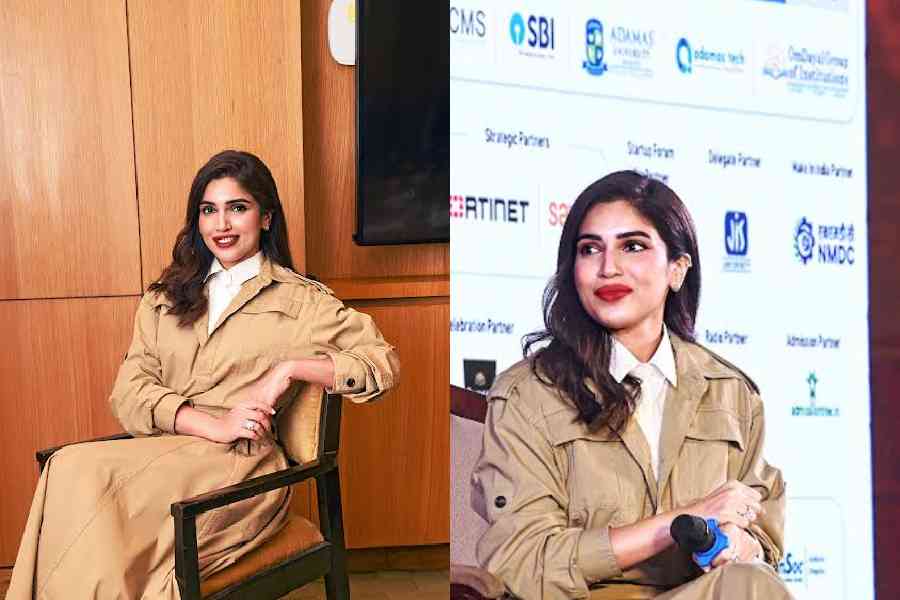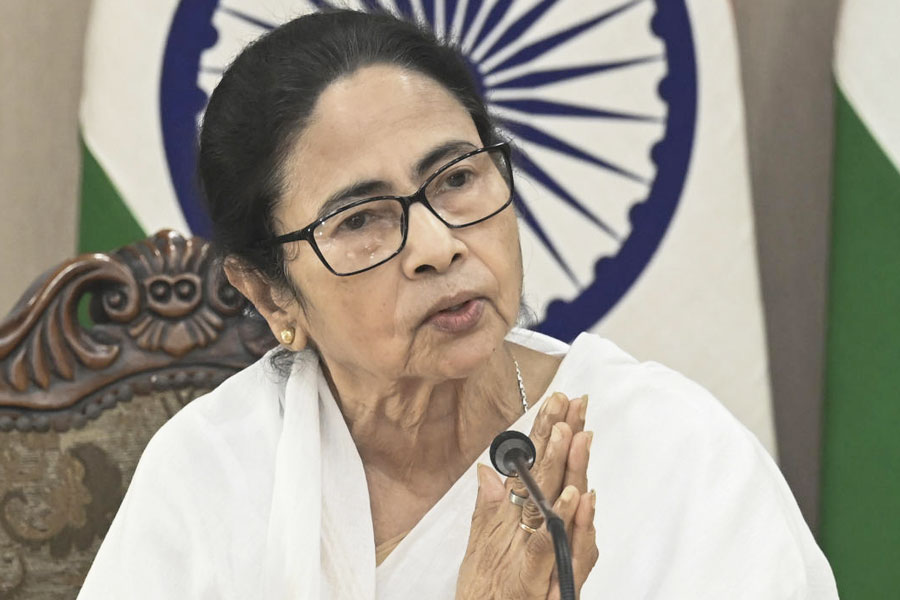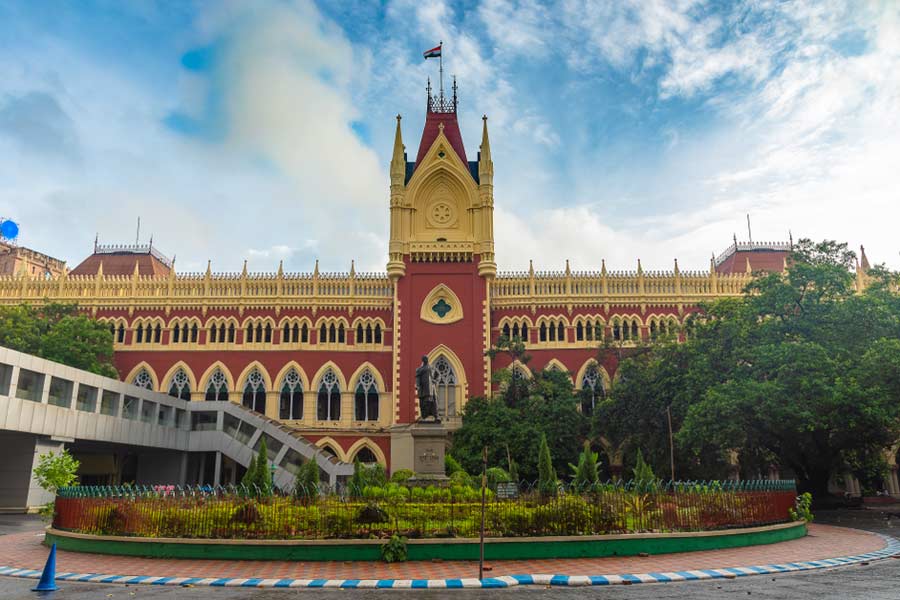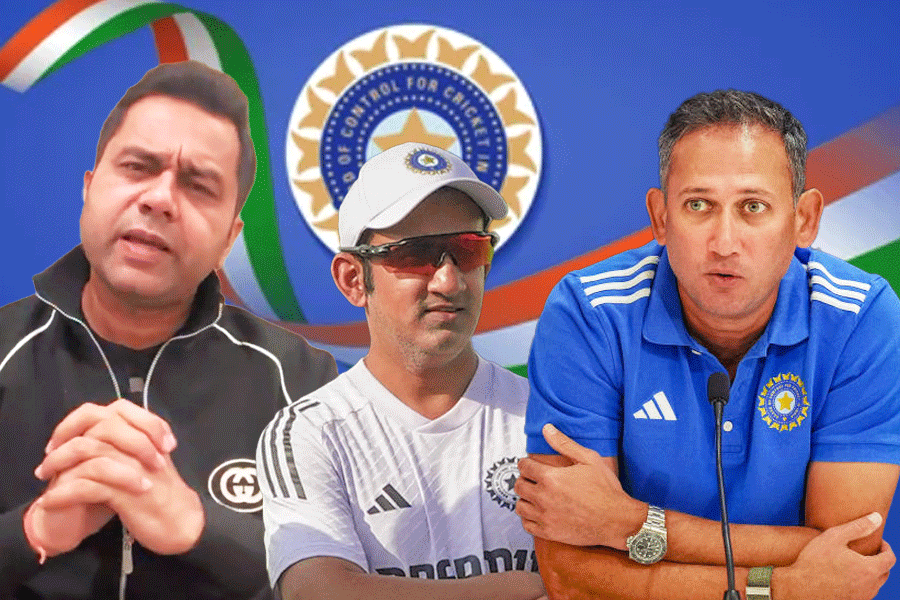Bhumi Pednekar has firmly carved a niche for herself as an actor with a predilection for socially-conscious films. Besides being a powerful performer with a varied repertoire of roles in less than a decade-old career, Bhumi is a vocal climate activist, environmental advocate, and a voice for sustainable living.
A founder of the ‘Climate Warrior’ initiative, a non-profit advocacy platform for climate change, the actress of films like Dum Laga Ke Haisha, Badhaai Do, Shubh Mangal Saavdhan and more, works tirelessly to be a catalyst for change, participating actively to raise awareness about the environment and the dangers it faces. Bhumi, 35, is also the National Advocate for the UN’s Sustainable Development Goals and recently launched The Bhumi Foundation to further her environmental initiatives. In other words, Bhumi is a consistent changemaker, a disruptor who has turned many a stereotype on its head, both on screen and off it.
Who better than the actor to participate in a panel on ‘Sustainable Disruptors’, held as part of Infocom 2024, an ABP Initiative. Bhumi was the spotlight speaker on Day One of the three-day summit, speaking to a packed audience at a session at ITC Sonar moderated by Priyanka Roy of t2. Excerpts.
Q Bhumi, the theme for Infocom 2024 is ‘Sustainable Disruptors’, a title you embody effortlessly. Let me start by lobbing this one in your court — what, for you, is a sustainable disruptor, and how do you think you fit that descriptor, in your career and in your life, organically or otherwise?
Thank you so much! I am going to complete a decade of my career next year. I often pinch myself because so much has happened over the last 10 years, and I am truly living my dream.
To me, a sustainable disruptor is somebody who is authentic, who stays true to who they are and what they resonate with. Life throws so much at you and if you don’t succumb to those pressures and still stick by your moral ground, by what your belief system is, I think that’s what a sustainable disruptor is. To constantly be the person that you are.
I think in the times that we are living in, the most difficult thing is to be honest, to be ourselves. Because there is so much noise around us. There are people constantly telling us: ‘You should do this, you should look this way, this is what you should be eating.’ There are digital platforms now and there is so much information that comes around to us.
I think what is so important is to stop all that noise, truly understand what your core is, and what your purpose is. Recognise your purpose and keep working towards it every day. That’s what makes you a disruptor. That’s what makes you an icon.
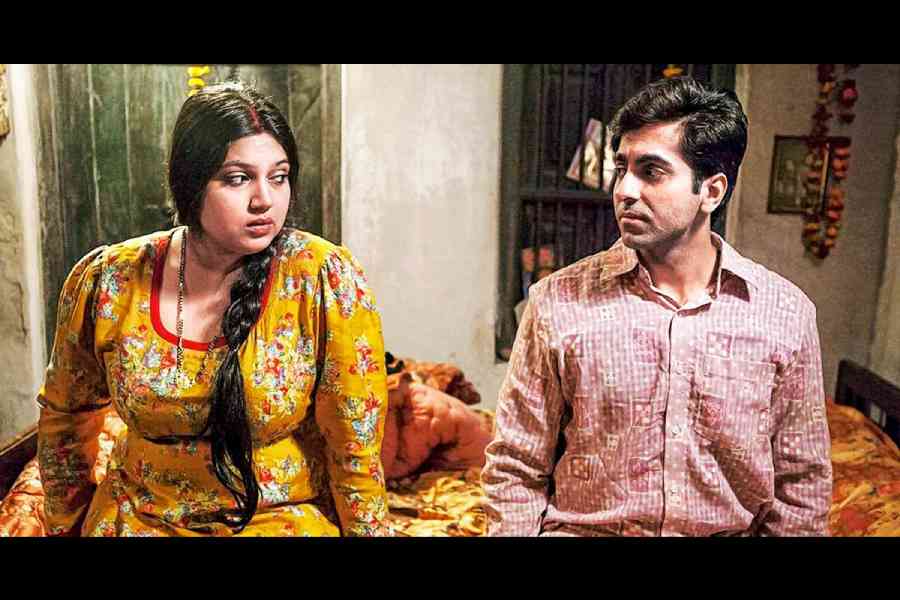
With Ayushmann Khurrana in Dum Laga Ke Haisha
Q You have always been very comfortable in your skin, an early indicator of which was your first film, Dum Laga Ke Haisha, where you shattered all the stereotypes of the so-called leading lady/Hindi cinema heroine. Dum Laga Ke Haisha remains a landmark film not only in your career but a watershed film in the history of Hindi cinema. You were several dozen kgs heavier for the role of a woman who has to deal with an insecure husband. What made you opt for that film instead of a so-called conventional Bollywood debut?
I don’t come from a film family. I had nobody who could have helped me create an opportunity for something that I wanted to do so deeply. So I hustled, I tried everything possible.
I started my career being an assistant casting director even though all I ever wanted to do was act. I worked my way up. I was very fortunate that my first job was at Yash Raj (Films) as an assistant casting director. I became so good at my job that I kept changing departments, but I was always like: ‘They will never ask me to leave and they will give me my first film.’ And that is what happened.
Coming to your question, I am so, so fortunate that my first film was Dum Laga Ke Haisha. Thank God that happened to me and thank God it was an unconventional role because that charted the next 10 years and that’s why I am sitting here in front of all of you. Had that film and that role not been so special, had it not been something that truly questioned the status quo, my subsequent choices would not have been as exciting and I would not have pushed myself the way I have over the years.
Why Dum Laga Ke Haisha? Because I didn’t have a choice. Destiny gave me that film. I was in a place at a point where this beautiful script was being made and because they heard me conduct auditions, they said: ‘Okay, we think she can act but does she want to act?’ I had never told anybody I wanted to be an actor. I was an assistant casting director and when they asked me, I was like: ‘Hell yeah! Whatever you need me to do!’
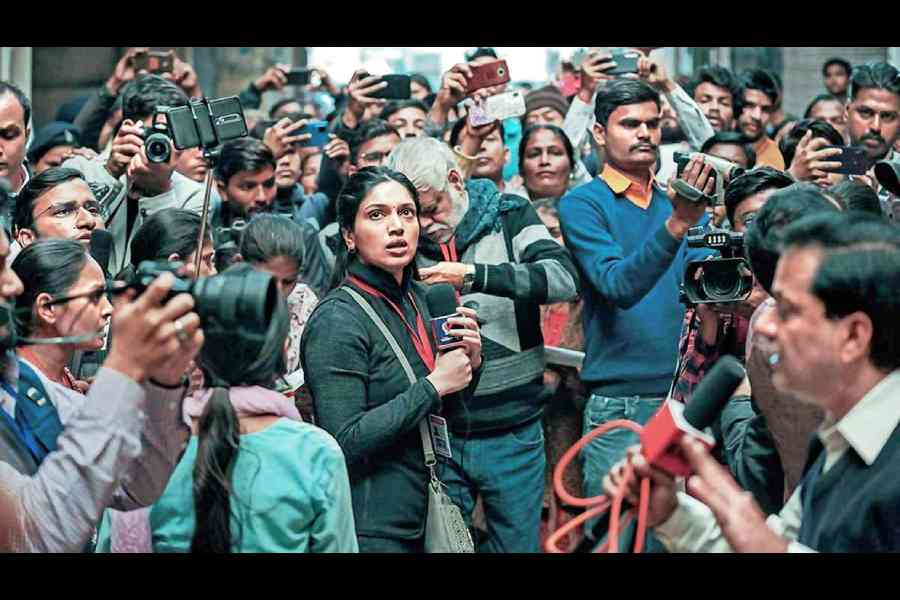
A still from Bhakshak
How many people get an opportunity like that?! I wasn’t even thinking about gaining weight or losing weight; I was just like: ‘Picture karne ko mil rahi hai mujhe, Yash Raj Films ki picture! Main heroine bann jaungi Yash Raj Films mein!’ Mere liye usse badi koi baat hi nahi thi. Because this doesn’t happen — a regular girl from a regular household where everybody was lawyers or doctors or engineers and all my parents ever wanted was that I take a traditional education path.
And then this googly happened, and for many years I couldn’t really tell anybody in my family what my plan was because people would laugh at me. Like: ‘Sure, you will get a film because you work as an AD, where does that happen?!’ That doesn’t happen! So it was destiny. I really think I was just at the right place at the right time.
Q Playing this character, and the kind of love that came for it and for the film, gave you a lot of confidence. Did you decide at that point in time that off-the-beaten-track is the route you want to take? And how much did the choices that came your way after Dum Laga Ke Haisha facilitate that?
Even when I was a film student, all the kinds of cinema that I enjoyed were films that had some meaning attached to them. I was really lucky that my first film was extremely performance-backed, content-backed. I realised that this is my path. I also wanted to maximise that opportunity and create a space for myself where I was irreplaceable.
I wanted to create a niche so strong that they knew that if there was a promise for a performance in a film, they would choose me. That’s all I tried. After my first film, I had remarkable opportunities. Right from Toilet: Ek Prem Katha as my second film... it was a dream to work with Akshay Kumar, and it is such an impact-driven film where the girl has such strong agency.
Then there was Shubh Mangal Saavdhan, where I tried comedy, but again that film had a message. It was just so ahead of its time. It’s actually one of my most favourite films. The opportunities that followed were so great.
My fourth film (a segment in Lust Stories) was with Zoya Akhtar, I got an opportunity to work with Abhishek Chaubey (in Sonchiriya)... these are hardcore filmmakers. Even now, I keep going back in time and think: ‘What happened? Why did I get these chances?’
Q Has any filmmaker told you that you are irreplaceable?
My last film, Bhakshak, was specially written for me. I remember my director, Pulkit, came to me and said: ‘Look, I have written this film for you, I don’t think anyone can be my Vaishali other than you.’ I have done heartland cinema, and I’m very proud that most of my characters are set in the heartland. But I still asked him: ‘Would you want to explore this with some actors who haven’t done it?’ and he said: ‘No, because I truly feel that this part needs a certain honesty and realism and performance, which I think you can lend to the film.’
For an actor, there is nothing more motivating and encouraging than that... just to note that there are filmmakers who trust you enough to cast you. Bhakshak is a very sensitive film... all I ever wanted to do was protect it — the theme and what it stood for.
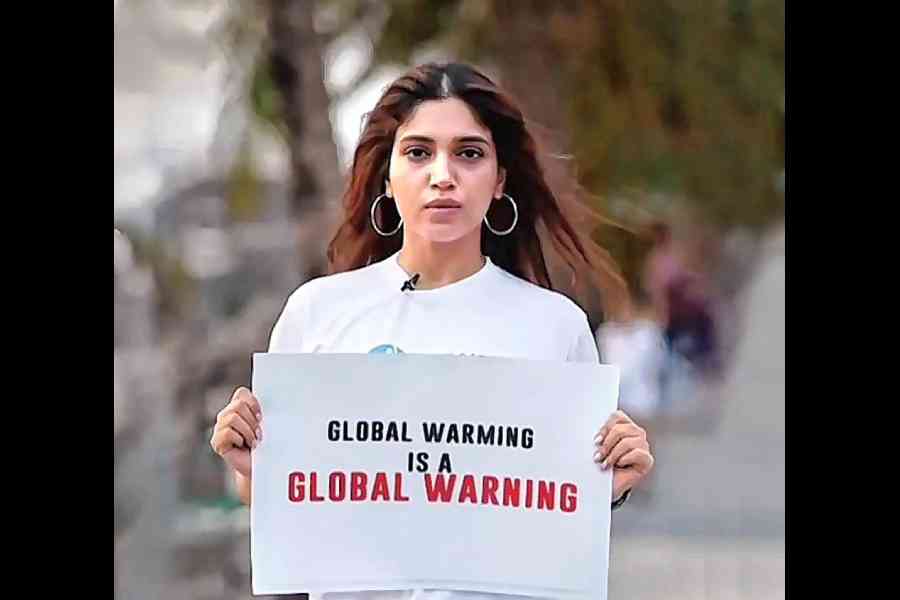
Bhumi is the founder of the Climate Warrior initiative, which aims to raise awareness about climate change and promote environmentally sustainable practices
When I finished shooting the film, Shah Rukh (Khan) sir (who produced the film) called me and we had the most wonderful 15-minute conversation. I was like: ‘See, this is why I became an actor’. I want appreciation. That keeps me motivated. That’s what keeps me going. It’s not easy to make certain choices but you have to. And when you make those choices and get love for them, you know that what you are doing is right.
Q How did you not fall into the trap of taking up some run-of-the-mill roles that may have come your way? How did you organically or even by design decide that these particular roles that you did are going to be disruptive in the larger scheme of things?
For any individual, especially if you are in the performing arts, you should only take up material that you have conviction in. Had I had conviction in those parts that maybe are a little more generic in their tone, I would have done them, but I never did. I knew that I would be extremely bad at them. So I started saying ‘no’ for various reasons.
The word ‘no’ has a lot of power. But often, women don’t know how to use it. We don’t know how to exercise it because we feel so burdened about refusing something, because we are constantly taught that: ‘Oh, there are only those many opportunities, and if you say no they will get somebody better.’ I am sure they might. All my colleagues are wonderful women so I’m sure they will, but we are constantly conditioned into being told: ‘Hum aap pe ehsaan kar rahein hain ki aapke paas yeh role aa raha hai’. But my stance is: ‘Par mera mann nahi hai! Toh aap rakho!’ (Laughs)
Q But it’s not always easy to say ‘no’, is it? You’ve evolved to a certain place to be able to say ‘no’, right?
Absolutely! It’s not like I have always been in this position. It’s taken me years of learning and unlearning and understanding what my value or worth is. And especially when a film doesn’t work. Through most of my journey as an actor, I only saw success, but then when that failure hits you, you don’t know what has hit you. Nobody prepares you for it.
Because, again, when you don’t come from an ecosystem that has generationally seen this path, there’s nobody telling you: ‘Listen there will also be a time when a film might not work.’ And that’s a really lonely journey. Failure is so lonely, but as actors we all are so resilient. We always rise from the ashes. We know how to collect ourselves but there is a lot of internal dialogue and debate.
Especially if it’s a huge film, and you’re like: ‘Okay but I only have four scenes and two songs, should I do it?’ The problem is not four scenes. The problem is what you are doing in those four scenes. I don’t enter Sonchiriya till the 40th minute but I won every award for that film. It is not about the duration of the film or the project itself. It is about how meaty that part is. Does it excite me enough to do it?
I have done a couple of projects where I have succumbed to the pressure, but I was so unhappy doing them. I said: ‘No. It’s not fair that I come onto a set where I am not my 100 per cent. It’s not fair to the makers or my co-actors or me.’ It really would affect my mental health.
I love acting. I love being on a film set. I thrive on a film set. I am up at 4.30am on a shoot day, ready to go. I love it! So I only want to do work where I feel energised.
Q It’s interesting you mentioned the fact that you could have four scenes in a film but those four scenes should have meaning and merit. Your film Bala, which had you in a relatively brief role, comes to mind. Despite the brief screen time, would you count that role as being hugely disruptive in your career?
A hundred per cent. There was so much conversation that that film started and it wasn’t just my character but also the presentation that Ayushmann (Khurrana) offered. I really thoroughly enjoyed working in the film and after watching it, I thought this was by far one of my finest work because it was so tough.
That film represented how society sees a quintessential pretty girl. The moment you have conventional beauty, a lot of attributes are taken away from you. Your intelligence is questioned. Your drive is questioned. Your ambitions are questioned. And I find that Amar Kaushik, the director, had such a beautiful take on that character (played by Yami Gautam Dhar).
She is one of my most favourite parts of the film. We all have the right to live the life that we want. So if she wanted a partner that was different, it’s her choice. Who are we to judge? The film was all about judgment and liberation. Bala definitely was a disruptor.
Q A few years go, I wrote a profile of yours in which I described the majority of your characters as ‘strong women with a very strong moral fibre belonging to small towns’. But even within that box, you have made each character different. How was that achieved?
It is a lot more challenging for me to play characters that are far away from me. I am a Bombay-born and bred girl. I haven’t really explored what heartland India looks like.
My films gave me that exposure. To play a character that is so away from me is a challenge. That is what I started enjoying. Having said that, most of the characters that belong to that socio-economic stratum... these women are all from different walks of life. And they all have their challenges. They all have their drives. They all are trying to break some kind of shackle. So for me, there was no monotony in playing those characters.
Yes, they might look like any other woman that you know, but that’s the beauty of it. I love representing the modern Indian woman on screen. And I think there are so many shades to them, and I don’t want to be boxed.
I am asked this question time and again... do you feel like you have been stereotyped? Not at all, because the narrative in each film is so different. We are a nation of a billion-plus people. There are so many stories.
Q Saandh Ki Aankh had you play a real-life sharpshooter in your ’60s while in Badhaai Do, you played a gay woman who opts for a lavender marriage. Both roles are very unconventional but you made them your own. What went into making these choices?
Saand Ki Aankh is one of my most favourite films. When it first came my way, I read it and I was so confused for the first 20 pages. I was like: ‘What part does he want me to play?’ That is because the protagonists were 63 and 65!
I called my director (Tushar Hiranandani) and said: ‘Look, I am really confused. What part do you want me to play? There is nothing age-appropriate for me here!’ He said: ‘ I want you to play one of the dadis!” And I was like: ‘What? Are you okay? Are you sure?!’ And he was like: ‘I feel you and Taapsee (Pannu) would be great for these roles!’ I said: ‘Okay, interesting!’ And I started reading it again....
My mother’s from Haryana and I have seen that world closely. I could never speak the language, but for me, Saand Ki Aankh was an ode to my grandmother. Everything that you see me do in the film is how my nani was. Everything, from the way I love my grandkids to the resilience the character had... because I had seen her so closely.
And then I spent incredible amounts of time with Chandro (Tomar) dadi and Prakashi (Tomar) dadi. Chandro dadi is no more but they are both icons. What they did for their community is something for the books. It’s historic. They come from a background where they lived in a parda. When we speak about the gender divide, that’s like the most it can get, but they broke every shackle and turned things around. What was their motivation? Their motivation was the girls in their family. They wanted them to have a better life, they wanted to be an example for them, and I was like, ‘This is a dream role!’
I got to work with Taapsee and I think our chemistry was crackling. She is still my sister. When you do such a special film, the bond is truly deep. There’s such deep love and respect that we have for each other. I am completely her hype girl and I think she’s completely my hype girl. I’m also saying this at this point because there’s this narrative that ladkiyaan dost nahi ho sakti — yeh kisi aadmi ne banaya tha because ladkiyaan bahut bahut achhi dost bann sakti hain. Girls are very good friends! We are human. There are no catfights. Everyone thinks that from the outside.
Many of my co-stars have been women: Konkona (Sensharma), Ananya (Panday), Taapsee, Kiara (Advani)... Rakul (Preet Singh) and I have done a film together, then there is Yami. I have done incredible amounts of work with women and it’s always been such a secure, safe space. Ladkiyaan dost nahi, behene hoti hain. There’s a code because we all have shared experiences. From whatever strata of society you might be, whatever your background is, whatever your upbringing is, certain shared experiences make us empathise with each other. And we do not go fighting over boys. Please let’s get over it. That doesn’t happen!
I think it’s very important to use platforms like this to encourage and have these conversations. I should use this platform to state that women are very, very tight because we all have one common goal in mind... and that is to bring about change.
We have all been a part of a certain amount of disparity, and we all are in our own ways just trying to make the gap smaller.
Badhaai Do is by far one of my most favourite films, even to watch. I have always been an ally. I have had queer friends. I’ve been part of many coming-out stories. When I was 15, I had a male friend come and tell me that he was gay. And I was like: ‘Okay. It’s fine.’ He was bullied and he wasn’t really accepted, but we formed a deep friendship. I remember going and telling my mom. She said: ‘So? Great! Good for him! At least he knows what he wants and who he’ll love.’
From then, my perspective has always been that the world needs to be inclusive. We all need to have the right to love who we want. How can we decide what’s natural and what’s not? Who are we to decide that? It’s the same as when they say: ‘Oh, naturally, women are supposed to be at home’. But who are you to decide that?! Similarly, who are you to decide whether I should love a man or a woman or what gender I identify with?
Because I feel so strongly about it, when Badhaai Do came, I jumped at it. I also love doing comedies. I think my best performances happen when I am doing a comic role. I hope the audience agrees with me but I really enjoy comedies and this was a film that really makes you laugh and makes you cry. All I want to say is ‘love is love’.
Q You started your career at a time when streaming platforms started booming and we have been witness to the fact that opportunities opened up and you didn’t really need to work within the limits of a certain box of Hindi cinema to be able to reach out to the audience. How much do you think that your career has benefited from this wave of change?
My experience with any streaming platform is rather recent. For an actor like me who’s constantly chasing the most impeccable content, I’m very, very thankful that there is more media available.
The theatrical game is very different today and you’ll are constantly told that only a particular kind of film will work in the theatres. I don’t agree with that but I don’t use streaming platforms as a way ki: ‘Achha theatre mein nahi jaa raha hai toh yahaan daal do.’ I think that’s abusing the platform.
I feel every story has the right audience, and streaming platforms should not be used to just dump films onto them. That’s not fair. But because of digital platforms, I think there have been such phenomenal technicians, filmmakers, and writers that have come up. It is very exciting.
What happened with my last film, Bhakshak, I was blown away. Because you know the genre is such, I didn’t know if it was going to be palatable. I was constantly told: ‘Listen, thodi dark picture hai, pata nahi kaise log dekhenge...’ It is on the exploitation of children and it’s a real story. But then the numbers came and I was shocked. The number of messages I got, in languages I couldn’t even read! I received insane amounts of love!
Digital is an empowering medium. From not wanting to do any, I finished two shows (Royals and Daldal) this year. I just loved the content! I really thought that this content was not being made in films. I am a product of good content. I go wherever I get a good story.
Q The last time we spoke, you said: ‘I am a shapeshifter and I am not defined by the way I look. My confidence comes to me from my roles’. How easy or difficult has it been to stick to that in an industry and in a job that for the most part looks at women and defines beauty by certain stereotypes and standards?
Now because I look different from what I did in my first film, people feel that I have succumbed to industry standards. No... this is how I am today! Tomorrow, if a filmmaker comes to me and says: ‘Would you be willing to look physically different because a film requires you to?’ I would say 100 per cent!
Having said that, a woman’s body is very complex. As I am growing older, what I have learned is I need to stop abusing my body. For my craft, I will do whatever it takes but I’m also human at the end of it, right?
Over the last couple of years, I have realised I need to respect what I have. I can’t be doing this the way I used to. But earlier, every three months, I looked like a different person! But it can’t keep happening that way because hormones are a very, very real thing. It takes a lot of work to keep your mind calm. So right now my full concentration is on keeping my brain healthy.
Q Do you think that when actors say that they lost or gained weight for a role or they built abs or put on prosthetics, it is a very simplistic way of describing the prep for a certain part?
Absolutely! Look, it is just not about physically transforming yourself. The process of prepping well for a character is very, very nuanced and complex. Just physically looking different does not cut it. There is a lot that goes into it. It goes from diction to thinking the way the character thinks.... It really shouldn’t be your only flex that you put in a lot of work to look different.
Many a time you will see, and not just in India, globally, that an actor’s six packs are spoken about… 100 marks for the effort! It takes so much work to look like that and maintain yourself and I think for boys, it’s a lot tougher. They constantly need to be muscular and have veins popping and all of that. It must be tough.
But then when we appreciate their craft, that can’t be the first thing we should be commenting on. Comment on something else. How did you like their work? How did you like their performance? Do you think they were convincing? Did they look the part?
Q A huge part of your persona is that of a climate change warrior. You have walked the talk and been very vocal about how we need to save our planet and that it starts from home. How did it start for you? Was it like a specific instance or is this something that was ingrained in you from childhood? You are called ‘Bhumi’ after all!
I think my parents had great intuition! I am called Bhumi, my sister, who is a lawyer, is called Samiksha, which means ‘analysis’.
I have grown up in a very empathetic environment. We were constantly taught to give back. I’ve seen my parents do that since I was very young. I think it inherently got passed on to me. My passion for the environment started when I was in school. It started with fear, I now realise that I had climate anxiety, which is a very real thing. You will be surprised how many young adults deal with climate anxiety every day. We are constantly taught that the climate is changing, the earth is heating up, and young adults are actually dealing with those repercussions right now.
Look at what happened in our capital (Delhi). Schools were shut down (because of poor air quality)! That’s not okay. The right to clean air is our basic right. We don’t have good nutrition! The world that I grew up in is not the world that my children are going to grow up in and that’s what I’m fighting for.
Climate change isn’t something that is meant for fictional stories, something that you see on screen, or in an apocalyptic world. No, all this is real! Recently in Himachal, there were massive forest fires. That looks like an apocalyptic world. There are floods, unseasonal torrential rain, crops getting destroyed....
We are really abusing our planet, and on a policy level, a lot needs to happen. But we can’t just put everything on the government. What are we doing on a personal level? Are we even doing something as simple as segregating our garbage at home? We are not even doing that. And then we complain: ‘Oh my God, there are landfills that are as high as a 10-ft building!’ Arrey, but that’s our kachra na, we have generated that! What are you doing about that?!
We also need strong practices and that’s what I’m constantly talking about on every platform... that we all need to understand that this is the largest threat that humanity is dealing with. Massive conglomerates are going towards sustainable practices because by the end of it, we all need to survive.
Q How does sustainability form a part of your daily life? What are the small things or the big things that you do?
I can give a couple of tips. I try my level best, I would say at least 99 per cent of the time... I don’t use, for example, single-use plastic. I don’t use plastic bottles. They are very bad for your health and they are very bad for the planet.
This also comes from a place of privilege because I have this information and I have an option, right? But even those who are in a place of privilege give their children water in plastic bottles. I get why... but the thing is, unfortunately, the way the world works, vulnerable communities are the first ones to get affected by our abuse, right?
I have ditched the use of plastic as much as I can. If we get any plastic packages, we send it for recycling. In India today, especially in the cities, there’s a very strong waste management recycling facility. All you have to do is Google: ‘Where can I send my plastic to get recycled?’ There are people who come home and pick it up for you. It’s as easy as that.
The idea is about having that thought, about having intention, about caring. So the moment you have intent, you find ways of making it happen. If I want to go on a holiday, don’t I figure out my entire itinerary? Then why can’t I do this?
It’s just being conscious about your consumption. Reuse, recycle, upcycle. Be proud of re-wearing clothes. Segregate your garbage. It is just about setting a practice in your kitchen. Don’t use litres of water to clean your house, to plant your trees. It’s horrible. It’s just not okay.
If you go to a village in India, you will see our culture is sustainable. I have seen my grandparents, my mother, constantly recycling things. They feel pain when they throw food. They feel pain when they waste anything. We don’t understand this because we want a life of convenience. We don’t have time. But we need to change that.
Q You’ve spoken about gender gap and lack of pay parity in Bollywood. What are the other pressing issues that you and your contemporaries face in the industry today that you would like to address in your own way?
One of the larger conversations is always about pay parity but I think that is just not in my industry, that is everywhere. We don’t have enough women in places of power, we don’t have women who are making policies, we don’t have women in leadership roles. We do, but there are a handful. That needs to change. See how disbalanced the power structure is... that is the problem.
I just read an article where finally there is research being done on women for our health. So even our medical research has previously not been based on us. Our optimal weight is not based on us. It is done by what a man who is my age, my height — his optimum weight should be this much. So let’s just start with that.
I strongly feel that the film industry is fairly democratic. Are there anti-social elements? Hundred per cent, like any other industry. But if you are on a film set, you will see a certain parity between men and women. And that really excites me. Like my last project, the producers were women, the DOP was a woman, the director was a woman, and I was leading the show, as a woman. It was just beautiful. I love working with women!

